Quick ways to free up RAM and lower RAM usage:
- Close unused applications.
- Disable unnecessary startup programs.
- Clear the page file before restarting your computer.
- Uninstall programs you no longer use.
- Reduce visual effects.
Nearly everyone has experienced trying to Google something on their device only to realize they’re waiting a lot longer than normal for the results to load. Maybe your phone starts getting hot in your hands or your laptop’s cooling fans start going when you open up a second application.
This is likely due to not having enough random access memory (RAM) on your device. Luckily, there’s a simple fix you can do yourself to help your devices run better. Keep reading to learn how to free up RAM and avoid a trip to the repair shop.

What Is RAM?
RAM is the short-term data that’s stored on your device’s memory chip. Essentially, it’s the memory that allows your devices to run different applications simultaneously so the system can complete multiple tasks at once. If you’re listening to music while sending an email or updating your system while watching your favorite TV show, you can thank your device’s RAM for that.
When you use up all of the available RAM memory, your computer’s performance can slow down because it doesn’t have the storage required to complete its tasks. When you clear RAM space, it gives your computer the capability to carry out tasks. Depending on your device, there are a few different ways you can free up RAM space. Keep reading for our ti
6 Ways to Free Up RAM on Any Computer
It can be easy to use up your RAM (and then wonder how to lower RAM usage) because it supports so many functions. Before you start removing programs from your computer, try these quick fixes to free up RAM space.
1. Restart Your Computer
The first thing you can try to free up RAM is restarting your computer. When you restart or turn off your computer, all of your RAM (stored data) will be wiped clean and programs will be rebooted. This can potentially clear out some processes and programs that are running behind the scenes, taking up your RAM storage.
2. Update Your Software
It’s important to run the most updated versions of your computer software and applications. Older renditions of software and apps can take more memory to process, causing your computer to slow down. Panda Dome Premium includes Update Manager, ensuring your computer is always up-to-date and running at its best.
3. Clear Your Cache
If you still find yourself short on RAM, the next option is to try deleting your cache. Like RAM, the cache stores short-term data to keep your device working smoothly. The key difference between cache and RAM is that the cache stores a smaller amount of data and is used for data you’d need to access very quickly.
The cache holds onto information that your computer uses to reload pages it has seen before rather than downloading them again. Sometimes your cache can take up a lot of space because it uses RAM for memory functions. The cache can save you time when browsing, but if you’re short on RAM, it’s something you can sacrifice with minimal effects on your device.
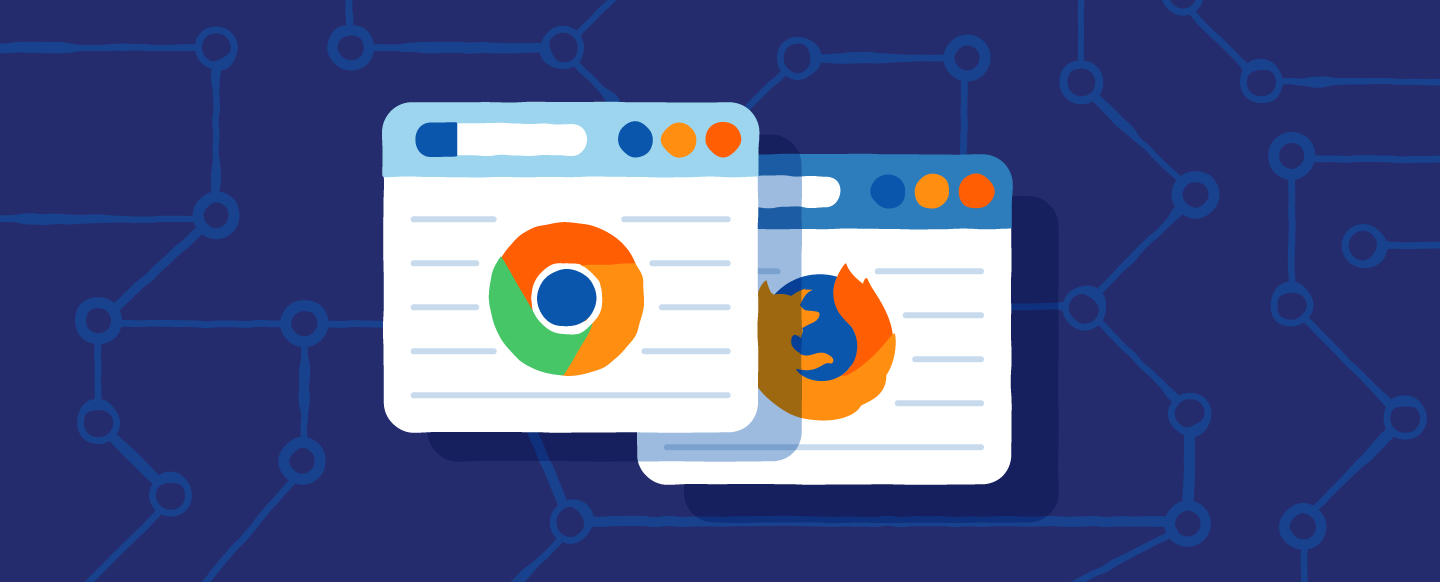
4. Try a Different Browser
Something else you can try is changing browsers, as some have been known to use more data than others. If you’re not already, try using a browser like Chrome or Firefox, which are typically good browsers for memory management.
5. Remove Browser Extensions
Many of your daily work and home computer operations have been made easy by the use of browser extensions. However, they also require memory, so you might want to think about disabling or removing your extensions.
6. Install Optimization Software
One of the easiest ways to manage the memory of your device is by using optimization software. These tools are designed to clean up unnecessary background processes, freeing up RAM and clearing memory automatically. They also help monitor RAM usage in real time and can lower RAM usage by eliminating resource-hogging applications.
6 Steps to Free Up RAM on Windows 11
If you are still having trouble figuring out how to lower your RAM usage, you might have too many programs and applications without even knowing. Try these five ways to free up RAM storage for Windows 11 computers and speed up your Windows PC.
1. Disable Startup Programs You Don’t Need
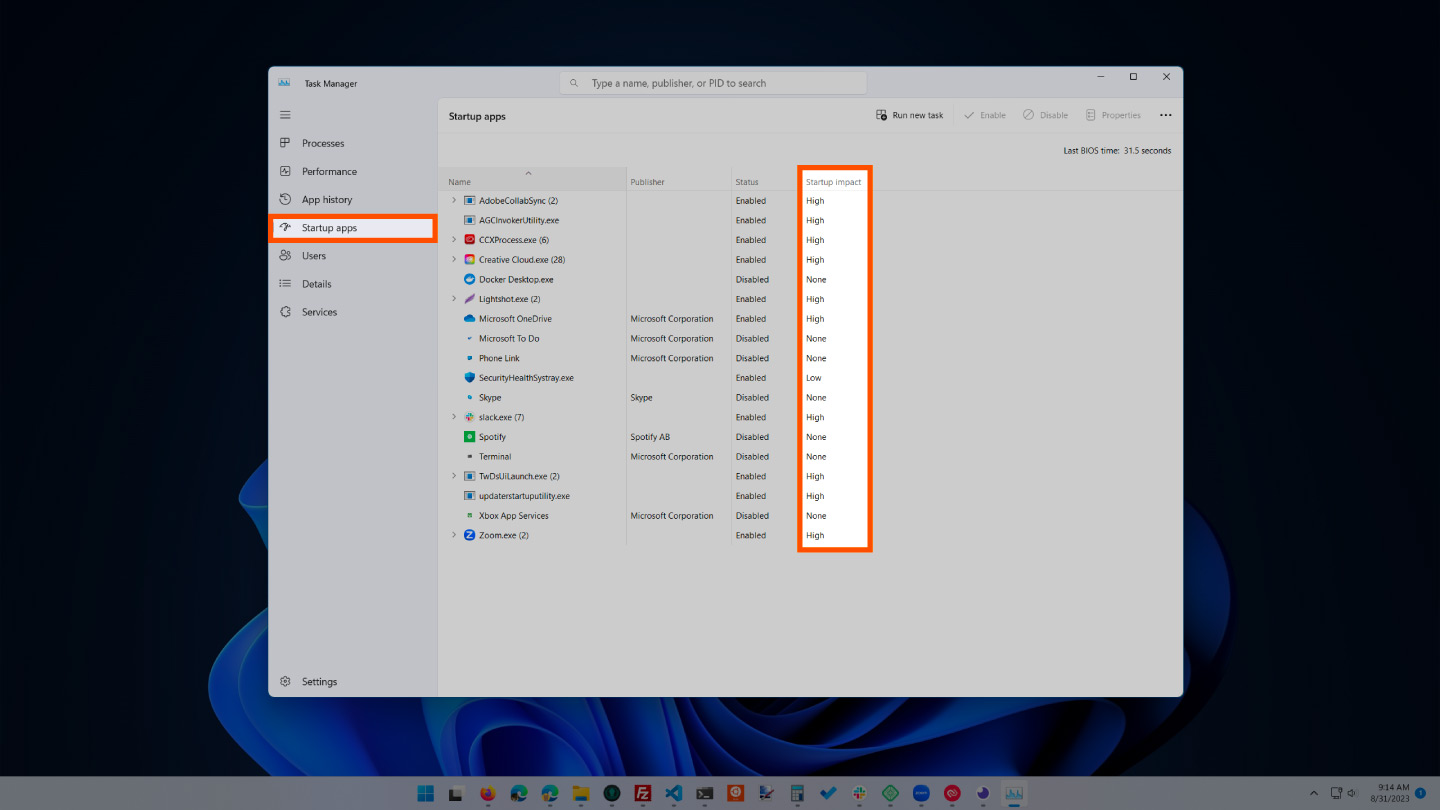
If you have used your computer for at least a few years, then you have probably downloaded a fair amount of software that you either forgot about or no longer use. After the processes tab tells you which programs use the most space, you will want to maneuver to the startup tab to stop those you no longer need.
To disable startup programs:
- Hold the Ctrl + Alt + Esc keys to open the Task Manager.
- Select the “Startup apps” tab from the Task Manager.
- Click “Startup impact” to organize the programs from high to low usage.
- Select the app you’d like to disable.
- Click “Disable” in the upper right corner.
Startup programs are those that activate when your computer is booted up. When these programs start, each one takes up a little bit of RAM in the background without your consent. After a while, all of the software and programs can add up. Be sure the ones that aren’t needed are disabled or removed.
2. Stop Running Background Apps
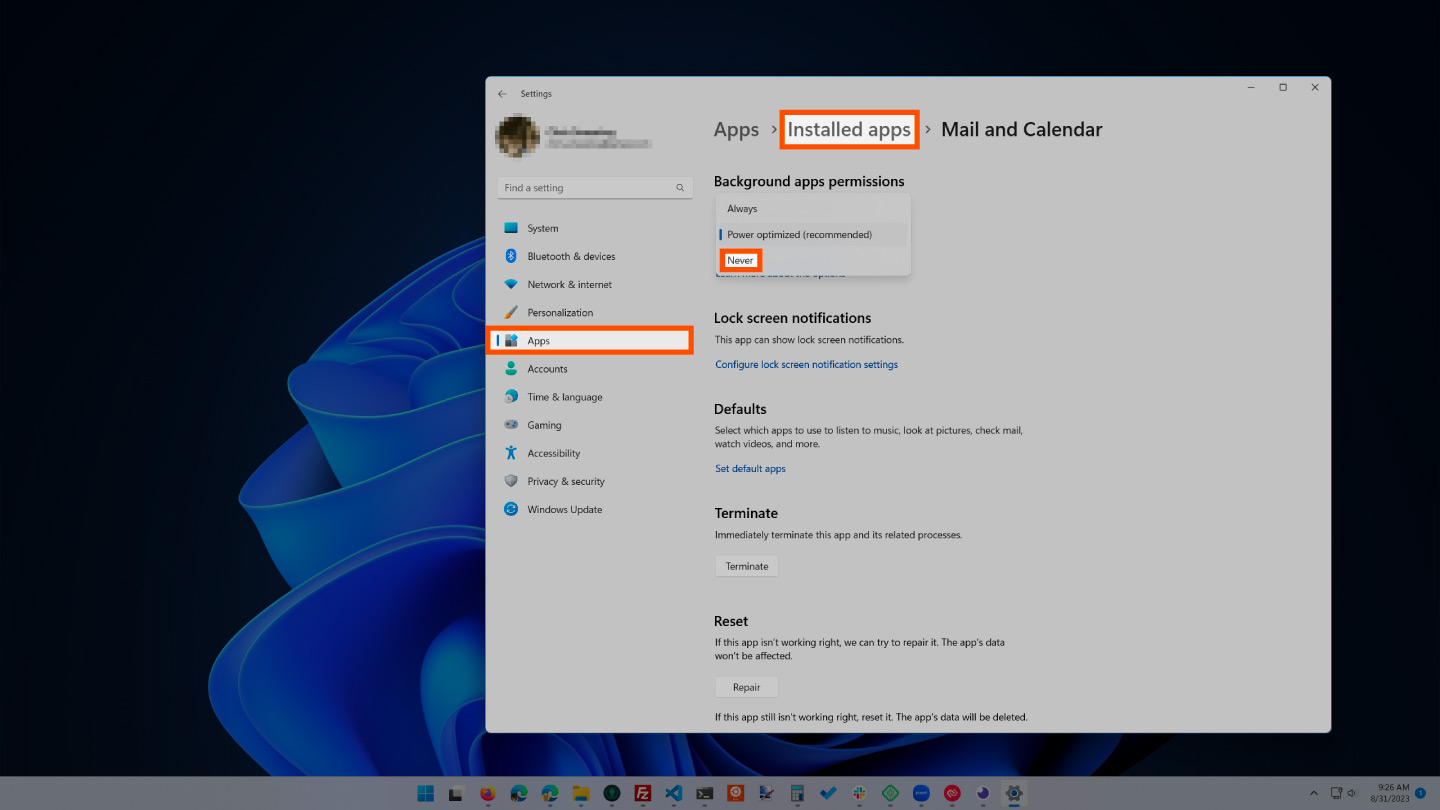
The next items that could be taking up RAM are applications that are set to automatically run in the background. You may have used your computer for years before noticing some of these apps taking up your RAM storage. This can quickly exhaust your memory, battery and data bandwidth.
To stop background apps:
- Go to computer settings.
- Click the “Apps” category.
- Click on “Apps & features.”
- Scroll to the app you’d like to disable and click the three dots to the right.
- Click on “Advanced options.”
- Select “Never” under the option “Let this app run in the background.”
Applications are often automatically set to run in the background of your device. This enables them to display notifications and update their software automatically. Turning this off on apps you don’t use can save RAM storage.
3. Reduce Visual Effects
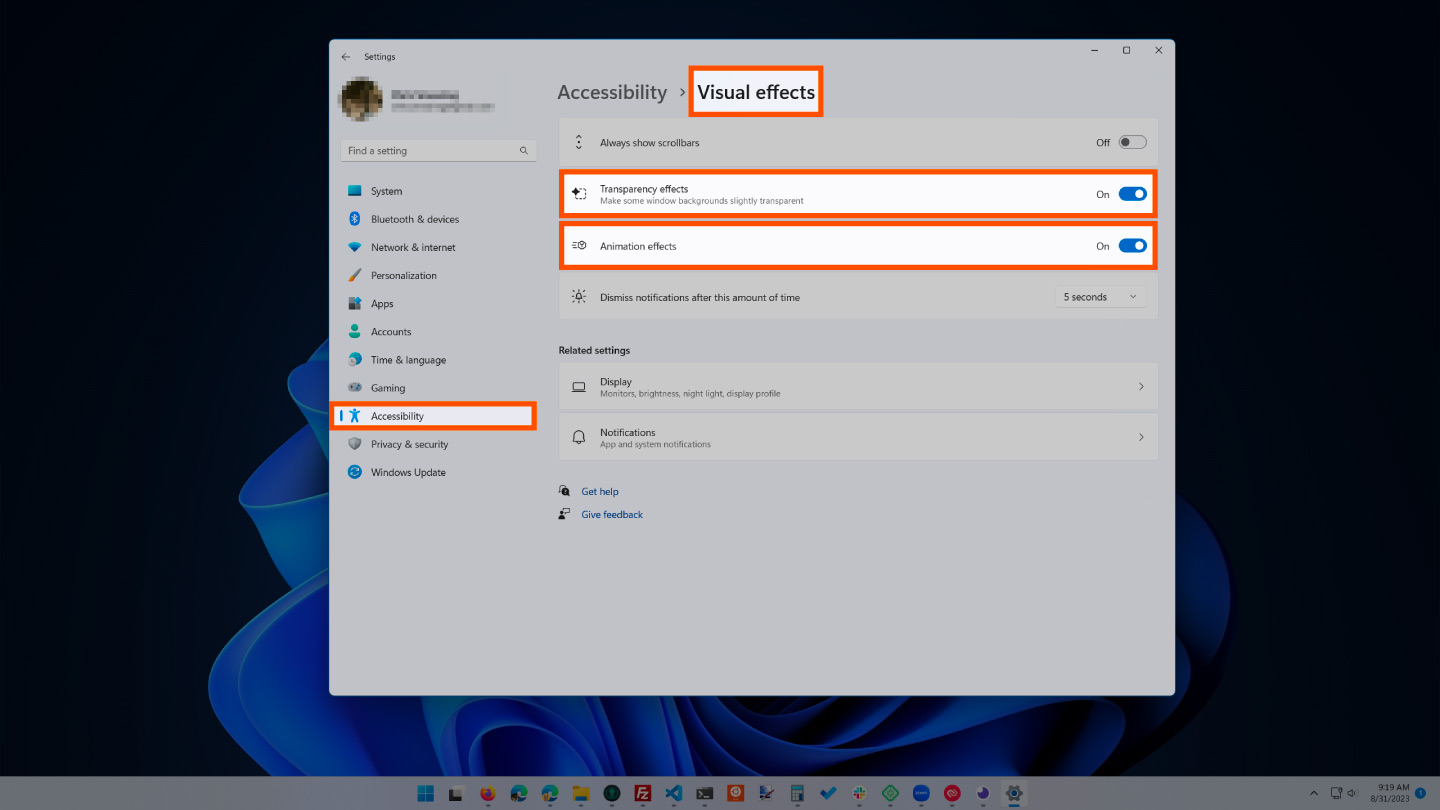
With improving technologies, there are many more possibilities for computer effects and visuals. For example, you can turn off the animations for apps and icons that use storage for unnecessary effects. If you seem to be running low on RAM storage, there are some effects you can shelve until you free up more memory.
To access your computer’s visual effects:
- Open your computer settings.
- Click on the Accessibility tab.
- Click “Visual effects.”
- Toggle off the switch next to “Animation effects.”
- Toggle off the switch next to “Transparency effects.”
This setting will disable all animated features on your computer, creating more storage but limiting your computer’s aesthetics significantly. However, you can also customize which visual effects your computer will perform to your preferences in the same tab.
4. Track Memory and Clean Up Processes
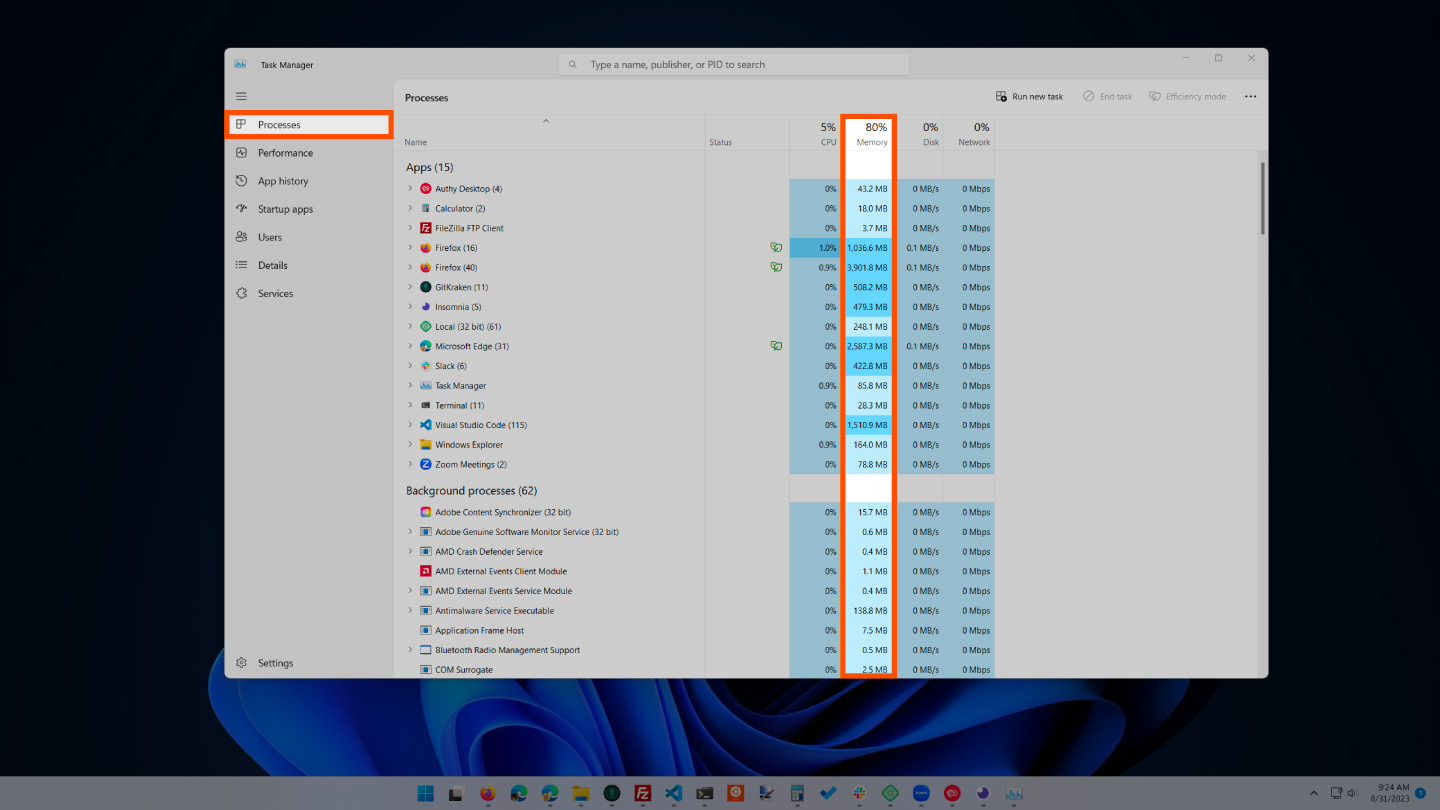
You should monitor your computer RAM usage so that you don’t deplete your supply before you really need it. To monitor your computer’s memory, you can navigate to the task manager to check the processes. This is where you’ll be able to see which programs are running and what kind of space they are taking up.
To locate your computer memory:
- Hold the Ctrl+Alt+Esc keys to open the Task Manager.
- Select the “Performance” tab.
- Click the “Memory” column to view how much space they are taking up.
You can now see which of your programs are taking up the most time and space on your computer. If you find anything suspicious eating up your memory, you should delete programs you don’t need or use.
5. Uninstall Programs You Don’t Use
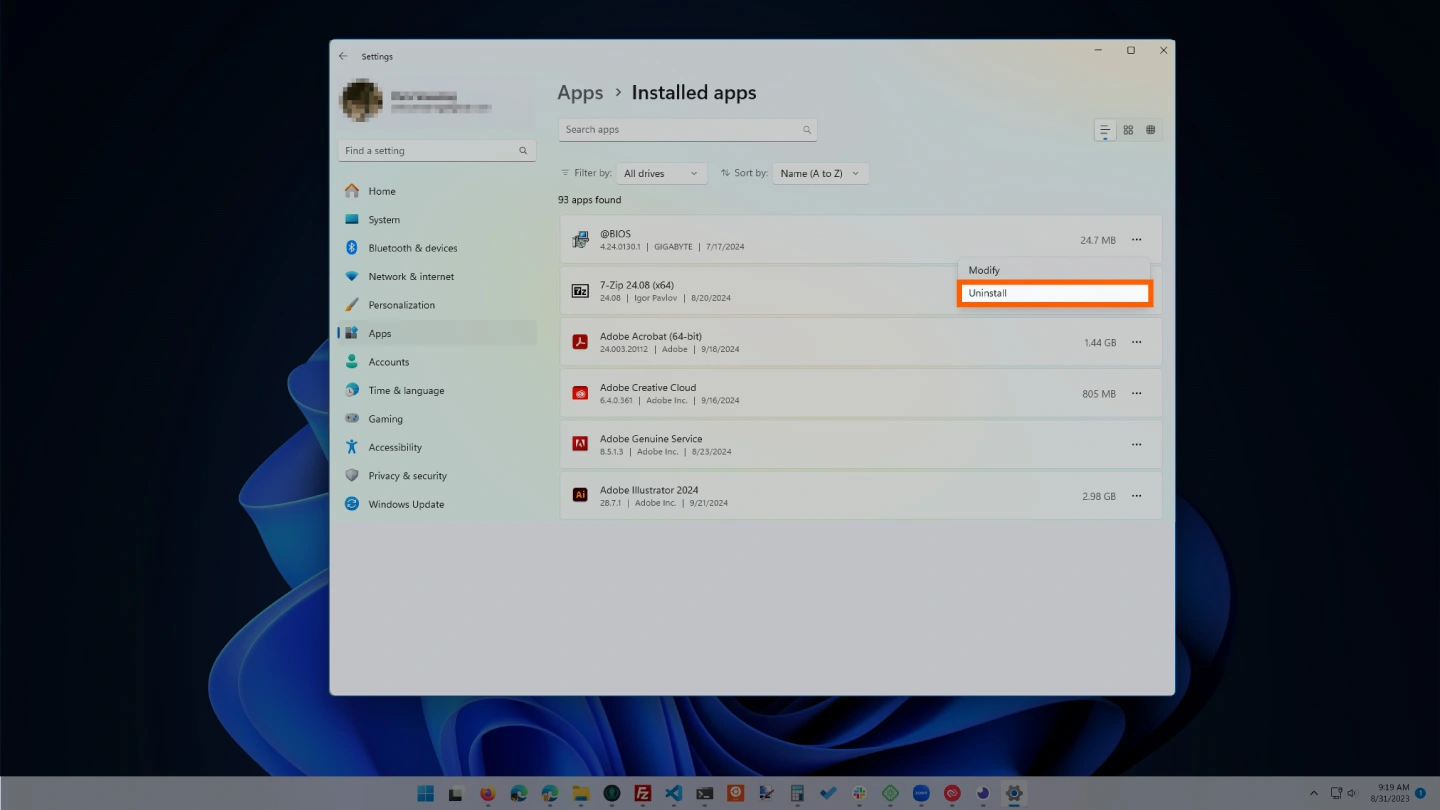
Unused programs take up valuable storage space and can indirectly affect your system’s performance, even if they aren’t actively running. Over time, these apps may install background services or receive updates that consume memory.
By uninstalling programs you no longer use, you can free up memory, reduce clutter and make your system run more efficiently. It also reduces potential security vulnerabilities from outdated software.
Steps to uninstall programs on Windows 11:
- Search “Add or remove programs” in the taskbar.
- Click the three dots next to the app you’d like to uninstall.
- Select “Uninstall.”
6. Clear Page File Before You Restart
The page file acts as virtual memory when your system runs out of physical RAM, temporarily storing data that would otherwise overwhelm your memory. However, over time, the page file can become cluttered with unnecessary data, which may slow down your system. Clearing the page file before restarting can help free up memory and improve performance.
Here’s how to clear the page file using the Windows Registry Editor:
- Click “Start” and look for “Registry Editor.”
- It will ask you to confirm letting the app make changes to your device. Click “Yes.”
- In the Registry Editor, navigate to:
HKEY_LOCAL_MACHINE\SYSTEM\CurrentControlSet\Control\Session Manager\Memory Management - Double-click on “ClearPageFileAtShutdown” in the right panel.
- Set the value to 1 and click “OK.”
- Restart your computer for the changes to take effect.
How to Check How Much RAM You Have on a Mac
For Mac users, there are many convenient tools to monitor and free up RAM storage on your computer.
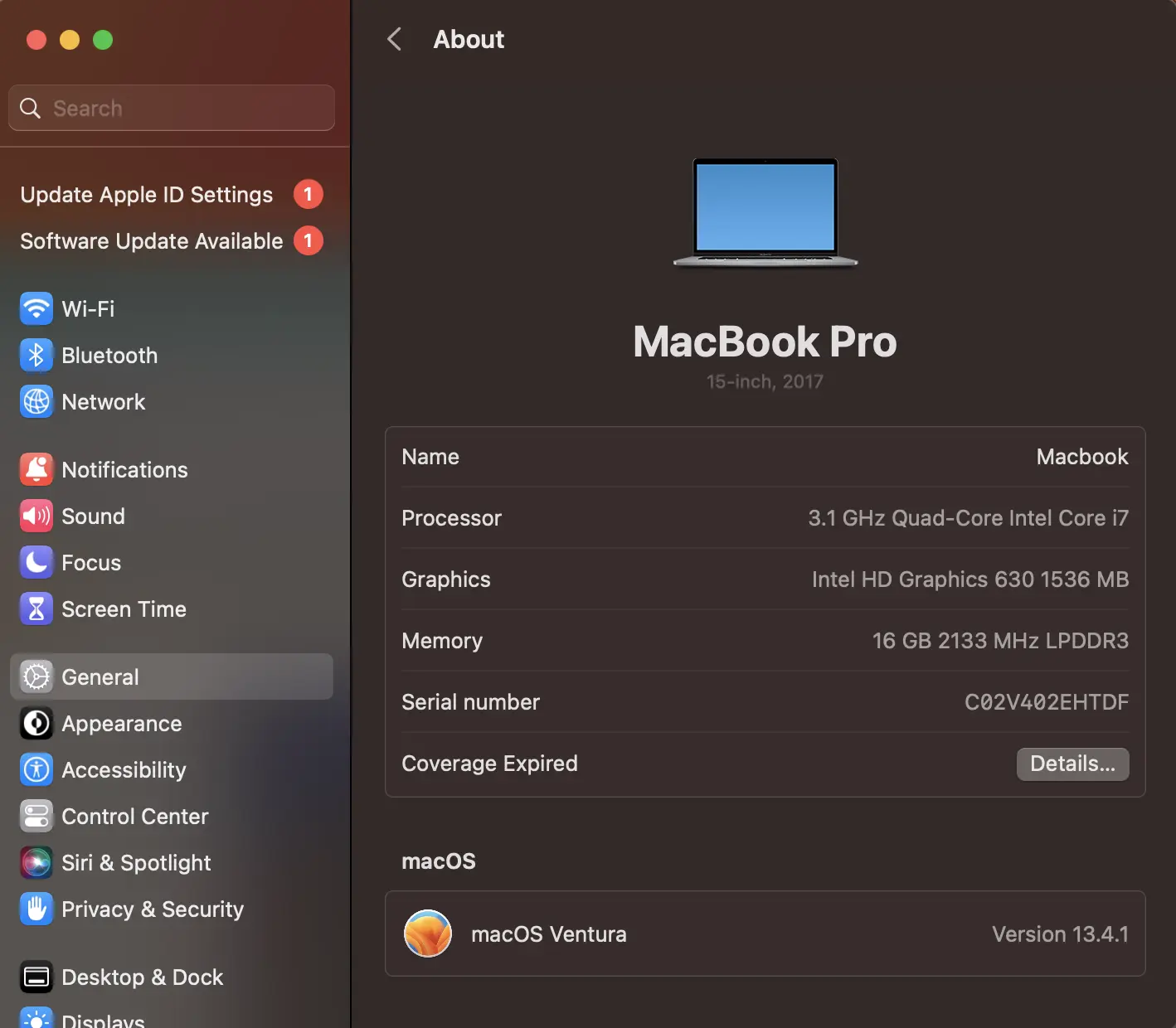
We’ve discussed how to determine how much RAM you have on a Windows computer above. Follow these steps to check how much RAM you have on a Mac:
- Click the Apple icon in the top left corner of your screen.
- Select “About This Mac.” An overview tab will open.
- Click “More Info…”
- Navigate to the General tab on the left side.
- Your RAM would be reflected against “Memory.”
5 Ways to Free Up RAM on Mac
For Mac users wondering how to free up RAM on Mac, there are many convenient tools to monitor and free up RAM storage on your computer.
1. Free Up Disk Space
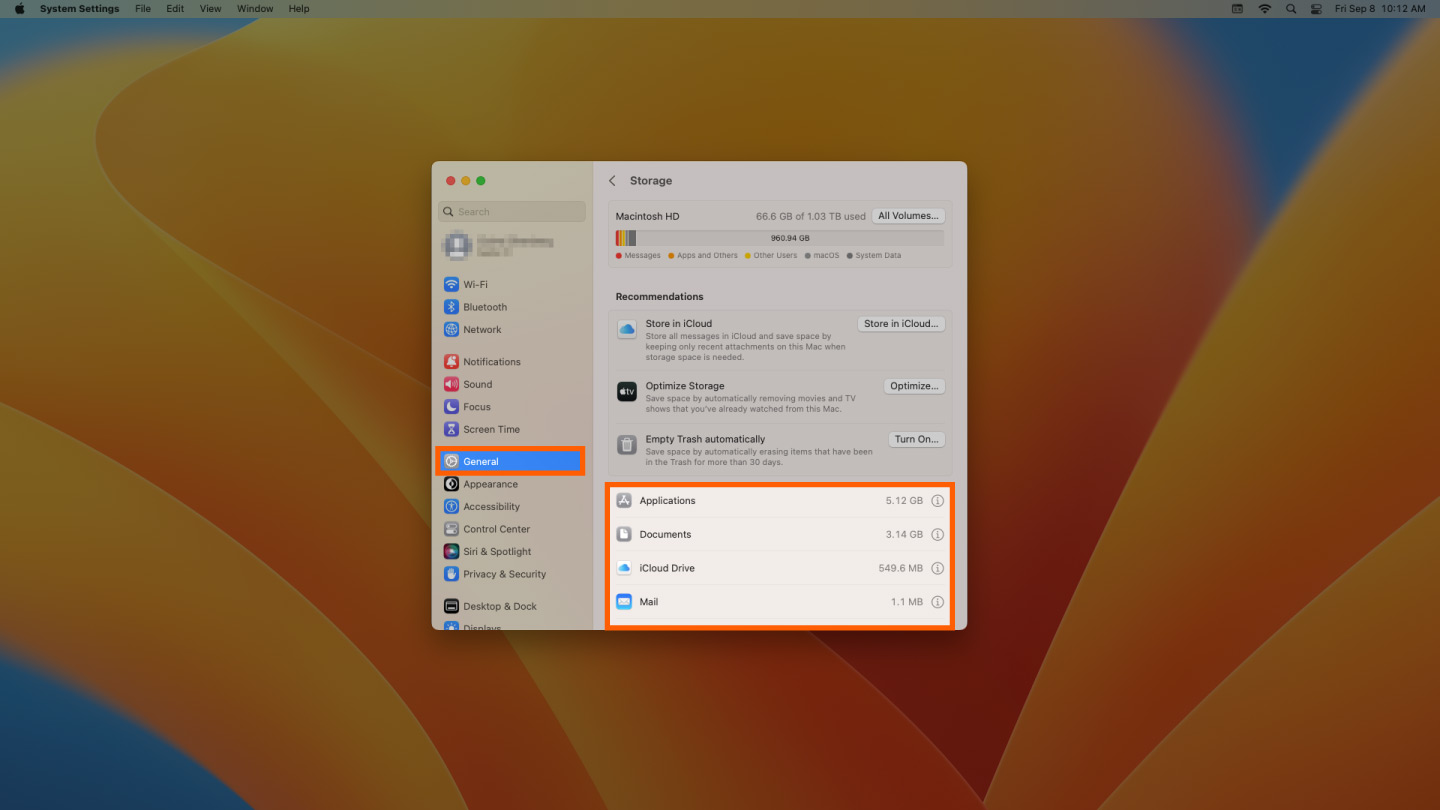
If you find that your RAM is completely full but you’re still in need of storage, you can use free space on your Mac’s drive called virtual memory. This extra storage is found on Mac computer’s hard drives so that you can continue running apps. The function is always on; however, to use virtual memory, you will need to be sure you have space available to swap.
Here’s how you can see what’s taking up space on your Mac to identify if there are any files or applications you can delete:
- Open the System Settings application.
- Click “General.”
- Click “Storage.”
- Scroll to view which applications are taking up the most memory.
2. Check Activity Monitor
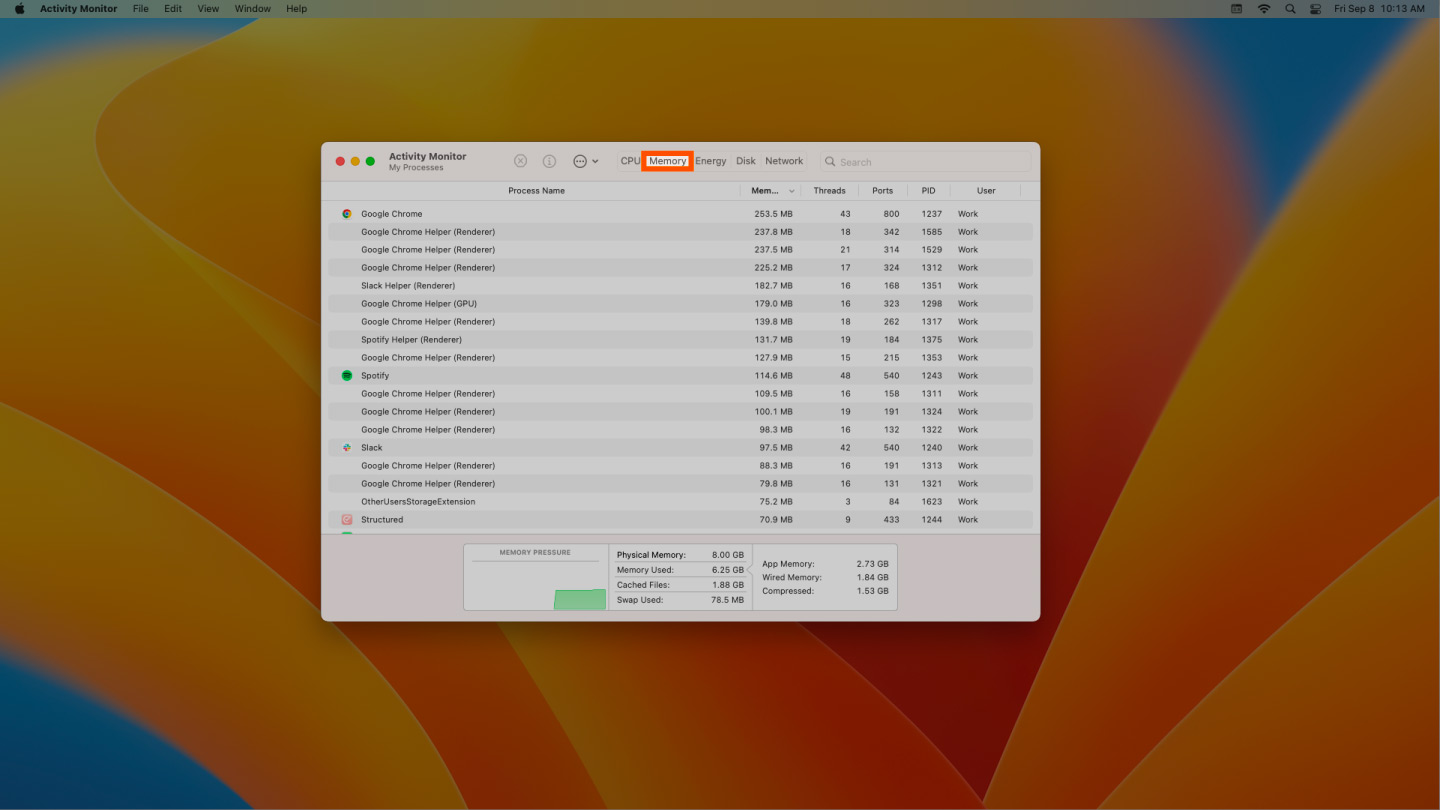
To keep track of your RAM usage on Mac, you can check the Activity Monitor, which shows you how much memory is being used and what’s using it. Utilize the Activity Monitor to determine which apps take up most of your RAM storage at any given moment.
To check the Activity Monitor:
- Search “Activity Monitor” in the spotlight search bar (Command + space).
- Click on the “Memory” tab.
- Manually quit the applications you’re not currently using.
3. Check CPU Usage
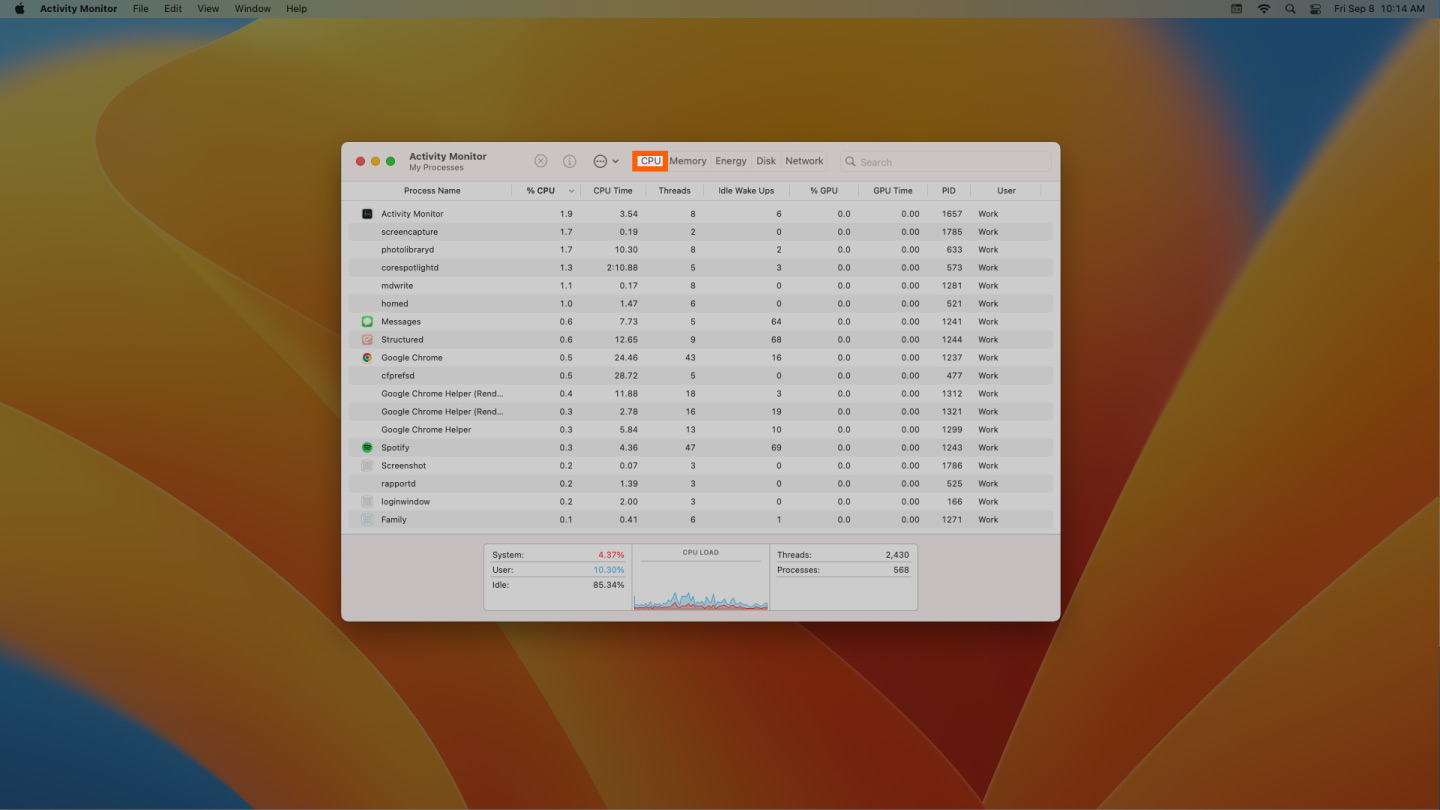
You can also use the Activity Monitor app to check your CPU health and usage. CPU is your central processing unit, and it carries out instructions from the computer software information stored as RAM.
To monitor your CPU, just select the CPU tab in front of the memory tab. This is where you can see if any apps take more processing power than others.
4. Fix the Finder (Close Finder Windows, Too)
When you open a new window in the Finder, the data each window displays gets stored as RAM. Adjusting the Finder preferences can make your folders open in tabs rather than new Finder windows.
To open your Finder preferences:
- Open Finder from the dock at the bottom of your screen.
- Click on “Settings” from the dropdown options.
- Check to “Open folders in tabs instead of new windows.”
5. Clean Up Programs and Applications
If you’re looking to keep a consistently healthy amount of RAM storage, then you’ll want to keep your computer clean and organized. A cluttered desktop is going to use storage much faster because macOS views each desktop icon as an active window. Even if you don’t think you can organize your files, putting everything into one general folder can free up a lot of RAM.
3 Additional Ways to Free Up RAM on Windows or Mac
The best thing to do is to be proactive with your computer’s RAM so you don’t have to worry about freeing up space. Try these additional ways to keep your RAM storage free

1. Install Extra RAM
You can always add more RAM to your computer if you have a lot of information you don’t want to delete. Buying and installing RAM is easy to do for a desktop computer but can be troublesome for laptops. Research what’s compatible with your device and invest in the correct type of RAM for your computer, as well as the correct amount for your specific storage needs. It’s always a good idea to visit a professional for their opinion and installation help.
2. Scan for Viruses and Malware
When you download any software programs or extensions to your computer, there’s the chance they could have a virus or malware attached. Once you have malware on your computer, it can steal both your information and your RAM space. To prevent picking up any malware or viruses, try using Panda Security antivirus to protect your computer and memory.
3. Install a Memory/RAM Cleaner
If you find that you don’t have time or you just can’t manage to organize your computer, there are memory cleaner apps to help you disinfect your computer. Many of these cleaners have special features for removing apps or extensions and allow users to manage their startup programs.
Optimize Your RAM Usage With Panda Dome
Apple iOS manages RAM automatically, so there aren’t typically issues with RAM space on an iPhone. However, if you feel like your phone is heating up or working slowly, a forced restart can help improve how your phone operates.
Now is the time to stop file hoarding. Many of the files on your computer are taking up RAM space without you realizing it. Now you know how to safely declutter your computer of these unused files and how to free up RAM so your computer runs more efficiently. To help you keep your device running smoothly, Panda Dome Family features cleanup, helping you remove unwanted files and keep your computer up to speed.
Ram Usage FAQ
Still not clear about how to decrease RAM usage? Here’s a quick FAQ to help you understand RAM better and manage it more effectively, including how to clear RAM and free up memory on a PC.
How Do I Know What Kind of RAM I Have?
To find out what kind of RAM you have, you can use the Task Manager or System Information on Windows or the About This Mac feature on a Mac. On Windows, open Task Manager, navigate to the Performance tab and click on “Memory.” On a Mac, go to the Apple menu, select “About This Mac,” click on “More Info…” and check the memory in the General tab.
Is It Possible to Download More RAM?
No, you cannot download more RAM. RAM is a hardware component of your computer, so if you need more memory, you’ll need to install additional RAM modules. However, you can optimize RAM usage and free up memory through various software tools and settings.
What’s a Normal Amount of RAM Usage at Idle?
Generally, around 30%-50% of your RAM may be in use when your PC is idle, but this can vary based on your system configuration and installed applications.
What’s the Best Way to Stop High RAM Usage?
To reduce high RAM usage, start by closing unused applications and disabling unnecessary startup programs. Additionally, you can clear the page file, uninstall unused programs, and consider adding more physical RAM if needed. Regularly monitoring your RAM usage and optimizing your system can help maintain better performance.


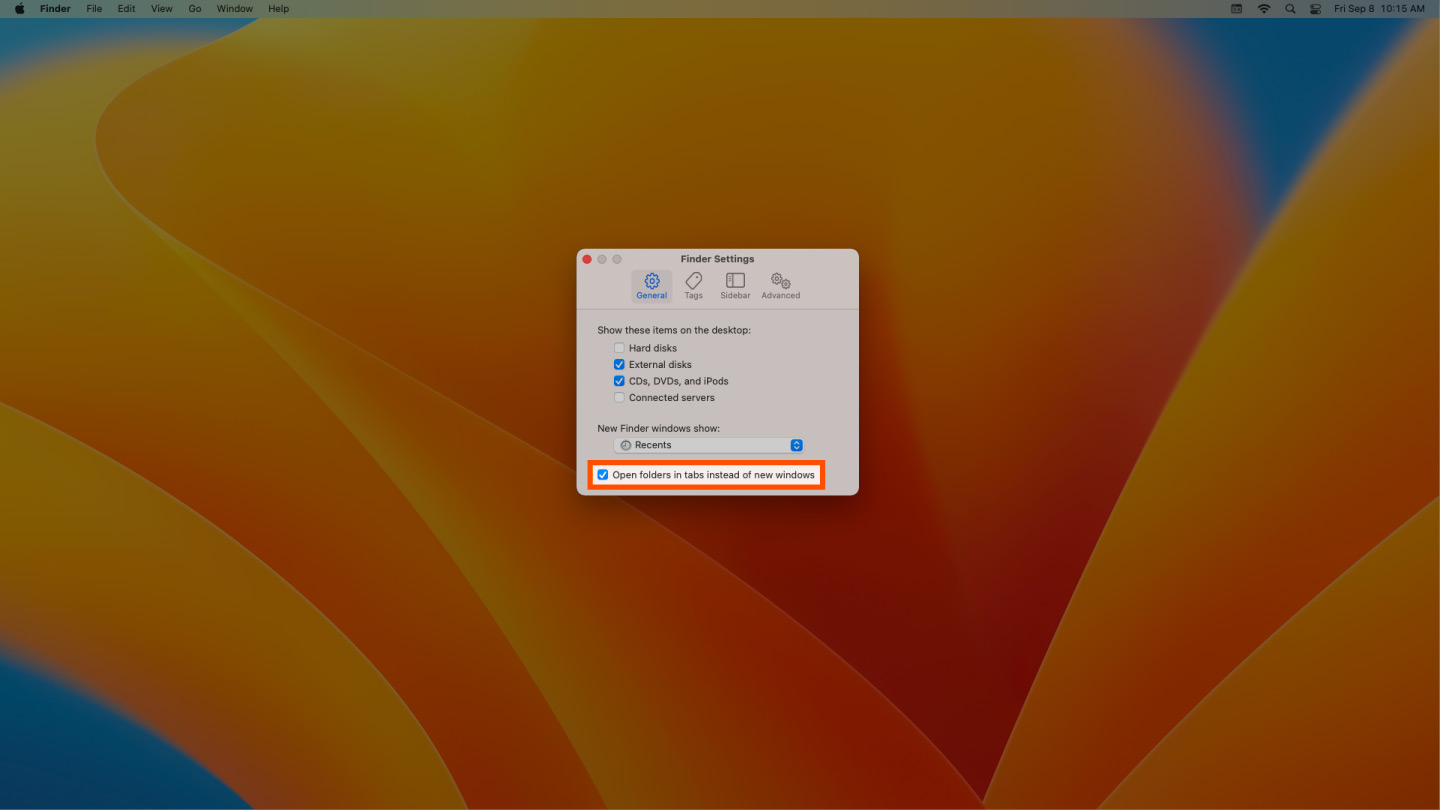





12 comments
How do I free up my ram for games
This literally says how
There is a software exclusively for games, it’s called “Razer Cortex”. It is sick ngl
worth it thanks bro
Thank you man , that was helpful …
Thanks for the great information. Really useful.
minecraft used 2 gb i had 5 before then i have 3 now i uninstalled minecraft and my memory is still 3 i almost tried everything but nothing works ive been stuck like this for 2 months i just wanna play tf2 and other games im almost full not much but not too much to use i have 6 gb installed but other times i installed minecraft my memory didnt change so anyone can help me i know here it says how to clean it but it dosent seem right to me.
Minecraft uses only 3 or 4 GB RAM. Please check your PC weather it has a malware or not using malwarebytes.
good informative article, but tell about how to decreases ram utilization in window 10
Thank you. Valuable tips I had no clue about. Hope this helps!
useful information for the regular user, thanx a bunch… I might even finally install Panda hahahh
Good advice- stopping programs running in the background certainly made my Mac work so much faster.